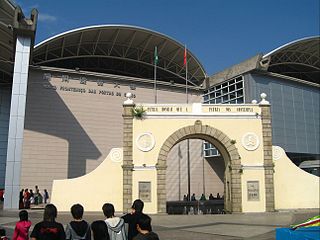
Freguesia de Nossa Senhora de Fátima is the northernmost and largest freguesia (parish) in Macau Peninsula, Macau. It has an area of 2.7 square kilometers (1.0 sq mi) and a population of 126,000, which constitutes about 40.3% of the peninsula's land mass and one-third of the population. It consists mostly of land reclaimed from the sea. Natural land comprises only a quarter of its current size. It was developed from farmlands in the 1960s and 1970s, to become an industrial area. Forty-one percent of Macau's factories are located in the parish.

Freguesia de Santo António is a freguesia on the western portion of the Macau Peninsula. It has the highest population density in Macau. The entire area is reclaimed from the sea.

Macau law is broadly based on Portuguese law, and therefore part of the civil law tradition of continental European legal systems. Portuguese law is itself highly influenced by German law. However, many other influences are present, including Chinese law, Italian law, and some narrow aspects of common law.

The Court of Final Appeal of Macau is the court with the final adjudication power on laws of Macau. Prior to 1999, the highest court was the Higher Court of Justice of Macau and prior to that the Court of Appeal of the Judiciary District of Lisbon in Portugal.

The Judiciary of Portugal is a system of courts that together constitute one of the four organs of Sovereignty as defined by the Portuguese Constitution. The courts are independent from the other three Portuguese organs of Sovereignty.
The Judiciary of Macau is responsible for the administration of justice in Macau. It hears all prosecutions and civil disputes, including disputes between individuals and the government. It is fundamental to Macau’s legal system that members of the judiciary are independent of the executive and legislative branches of the government. The courts of law in Macau comprise the Court of Final Appeal and 11 other courts. The President of the Court of Final Appeal of the Macau Special Administrative Region is head of the judiciary. A bilingual court system in which Chinese, Portuguese or both can be used was put in place, in accordance with the requirement of the Basic Law.

Elpídio Donizetti, is a Brazilian jurist, professor of Private Law and Procedural Law, chief judge of the Court of Appeal of Minas Gerais State (TJMG), author of various juridical works and takes part of the jurists committee responsible for writing the new procedural law code.
Slap Software,, is a Brazilian open source system. It was developed to be used in the automation of judicial, administrative and legislative procedures. It is registered in National Industrial Property Institute (INPI). The applications deal with systems with features of research, control, follow-up and the storing of data, including judicial automation, digital procedure, electronic process of law, or protocol.

The Second term of Fernando Chui Sai On as Chief Executive of Macau, officially considered part of "The 4th term Chief Executive of Macau", relates to the period of governance of Macau since the transfer of sovereignty of Macau, between 20 December 2014 and 20 December 2019. Fernando Chui Sai On was reelected in mid 2014 by 400-member Selection Committee.
Lionel Leong or Leong Vai Tac, local Chinese, is a political figure of the Macao Special Administrative Region of the People's Republic of China.
The 2017 Macanese general election took place on 17 September 2017 according to the provisions of the Basic Law of Macau. Out of a total of 33 seats, 14 were directly elected by universal suffrage under the highest averages method, while 12 were voted on from the Functional constituency, and 7 from nomination by the Chief Executive.

Flávio José Arns is a federal senator of Brazil representing his home state of Paraná. He was previously vice-governor of Paraná from 2011 to 2015, and also served in the chamber of deputies from 1991 to 2003.







